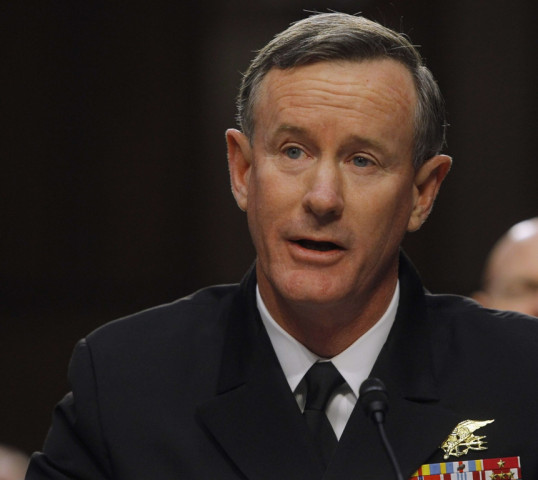US exit from Afghanistan could bolster Qaeda: Commander
Commander says al Qaeda leadership is weak in Pakistan, withdrawal from Afghanistan can revive terror network.

The head of special operations command, Admiral William McRaven, known for overseeing the 2011 raid by Navy SEAL commandos that killed al Qaeda founder Osama bin Laden in his Pakistani compound. PHOTO: REUTERS
The warning came from the head of special operations command, Admiral William McRaven, known for overseeing the 2011 raid by Navy SEAL commandos that killed al Qaeda founder Osama bin Laden in his Pakistani compound.
"If we do go to zero, and there is no special operations component left in Afghanistan, it will certainly make it more difficult to be able to deal with the threat, ...and the potential resurgence of al Qaeda in the area," McRaven told the House Armed Services Committee.
He said the danger posed by al Qaeda is "inherent within the federally administered tribal areas (in Pakistan), and in the northern part of Afghanistan, in Kunar and Nuristan (provinces)."
While most US-led forces are withdrawing from Afghanistan by the end of the year, Washington favors leaving a small force of up to 10,000 to train Afghan troops and counter al Qaeda in the region.
But Afghan President Hamid Karzai has so far refused to sign a bilateral security agreement that sets the legal framework for NATO troops to stay.
The Pentagon has begun planning for a full withdrawal, while US officials hope that a new president due to be elected in an April vote may be more willing to sign the security deal.
US officials privately acknowledge that retaining a military presence in eastern Afghanistan is vital for the continued use of air bases and intelligence operations needed for drone attacks against terror suspects in Pakistan's tribal belt.
Assessing the threat posed by al Qaeda, McRaven told lawmakers that the group's core "has gotten markedly weaker" while affiliate groups are surging in Yemen, North Africa, Iraq and Syria.
"So the threat is metastasizing. It is much more broad," he said.
But he said the danger presented by al Qaeda to the US "homeland" was less than it was five or ten years ago, with "one or two exceptions."

1724319076-0/Untitled-design-(5)1724319076-0-208x130.webp)

















COMMENTS
Comments are moderated and generally will be posted if they are on-topic and not abusive.
For more information, please see our Comments FAQ